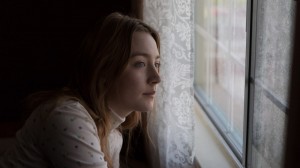You don’t want to be here.
No one wants to investigate the subdued horrors that follow when a daughter reunites with her parents after being kidnapped & held in a basement for 17 years – yet this well told tale surprisingly takes you in a different direction.
Armed with her 2012 Nichcoll Fellowship script, first time writer-director Nikole Beckworth only starts to take you down the path toward a narrative that would usually fall deep into melodramatic territory but instead winds up delivering a creepy treatise regarding the concept of just how far one can go in forcing someone to love you.
The obvious scenes of the young kidnapped girl (in flashback) triumph because Jason Isaac’s performance is only creepy because he’s so truly in love with his captive. To the point that he believes he’d never hurt her and is actually protecting her from the world he says has ended outside of their safety zone in the basement.
Most importantly, Leanne (Saoirse Ronan) fully believes her captor and sees him as a mentor and caregiver.
Now, as a freed 22 year-old, she is conflicted with feelings of betrayal (the world didn’t end and she was merely kidnapped) and separation anxiety from someone she truly loves.
His dynamic mixes well with her disconnect from her real parents as her mom Marcy (Cynthia Nixon) traverses a trail that begins in the realm of a grieving mom given a second chance but winds up utterly unraveling when her self help books fail to oull her through the reunion she’s only dreamed about.
As Leanne sees a therapist and Marcy’s attempts to rebuild her family fail, it would be about at this point the film would usually get mired down into melodramatics, instead – it takes one hell of a left turn.
Without giving too much away, it can be said that Marcy becomes the devil who she’s despised as she too now is trying to force Leanne to love her.
She goes to great lengths for such pursuits and since Marcy’s behavior is what Leanne has been used to for much of her life, her mom manages a few baby steps toward engaging her lost daughter into a semblance of a relationship. But Leanne is smarter now and the old tricks won’t fully work as she yearns to grow up and gain her own identity.
This leads us to the ending – which won’t be spoiled here – but truly shows a mature hand behind the screen since Beckwith allows her character to take what she’s learned and attempt to find her own path toward love, no matter how psychotically bad that idea is presented, it once again comes from messed up but pure place which works only to reinforce how morally damaged Leanne is and how cycles of abuse manage to keep repeating themselves to the point of being handed down generationally.
Beckwith wrote roles strong enough to attract the fantastic talent and this film should lead to other promising opportunities to come.
–Jeff Goldsmith is the publisher of Backstory on the iPad and the host of The Q&A with Jeff Goldsmith podcast in iTunes. Follow him on Twitter as @yogoldsmith
Learn more from the Sundance Guide Description.
A young woman is reunited with her parents, Marcy and Glen, after being abducted 17 years earlier. Raised in a suburban basement and renamed Leia by her kidnapper, Ben, she was told the outside world had come to an end, and now she must completely reconceive her perception of it. The bright 22-year-old is also forced to reconcile her new life with parents who are virtual strangers and her past life of captivity with Ben, on whom she was completely dependent. As Leia’s growing alienation leads to her longing for Ben, Marcy slowly implodes in her attempts to reclaim her child, and the notion of what it is to be free is called into question.
In a haunting, nuanced performance, Saoirse Ronan is quietly spellbinding as a young woman whose entire basis of knowledge is shattered and her concept of home erased. Writer/director Nikole Beckwith, in an impressive debut feature, strips away the sensational tabloid fodder of the narrative to examine the origins of self, identity, and the power of language. —K.Y.
Director: Nikole Beckwith
Screenwriter: Nikole Beckwith
